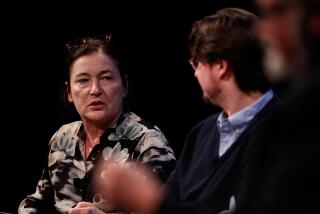Poet C.D. Wright was ‘one of the great ones’
When C.D. Wright died Jan. 12, American poetry lost one of the great ones, one of the figures who changed what the language can do, one of the writers whose lines and titles, sentences and similes are going to last at least as long as American English. That’s something I believe, but it’s also something that seems inappropriate, even rude, to say, because Wright’s artistic powers cannot be separated from her deep sense of democracy, her work against boundaries, rankings and exclusions, her insistence that poetry, and society, should become, not a hierarchy or a star system or a way to exalt a singular self, but a way to be generous, to share the powers we get, to give of oneself, to let everybody come in.
She came, as all her readers have noticed, from the Ozarks, the daughter of a judge and a court reporter whose stenotype’s imprint adorns the interior pages of her 1998 mostly-prose poem “Deepstep Come Shining.” Wright’s earliest poems, penned in Arkansas in the 1970s, exercised a scary, compact, post-Surrealist, Southern Gothic mode, shared with the charismatic, prolific, self-destructive poet Frank Stanford, whose life and death Wright’s “Translation of the Gospel Back Into Tongues” (1982) remembers. “Maybe you have to be from there to hear it sing,” Wright would speculate later, in her beautiful compact sequence “The Ozark Odes” -- but part of the point of her projects was that you don’t. The crackle and idiosyncrasy of her language, the concretely sensory weirdness of it all, meant that you didn’t have to live Wright’s life, or anything like it, to feel that she spoke to you.
To learn how to write that way, she had to leave: first for San Francisco, where she encountered dry avant-garde techniques and wove them -- one of the first poets to do so -- into what had been steamy late Romantic modes. In San Francisco, too, she met Forrest Gander, later to become an important poet (start with “Torn Awake”) and a major translator and editor of Spanish-language poetry (look for his “Lost Poems of Pablo Neruda” soon). Gander and Wright fell in love and moved briefly to Mexico. Then, in 1983, Wright got a job at Brown University. For the next three decades, young American poets who wanted to sound both personal and strange, both observant and unpredictable, who wanted both to experiment and to sing, would try to study with her there.
Never exclusively Southern -- never exclusively anything -- Wright would make books, maps, objects about her original and her adopted homes. Mexico (to which they returned) figures in the splendid, terse bilingual retablos poems of the early 2000s: “Escúchame / Chuparosa,” one prays. Providence and its oceanside suburbs are part of the background in “Tremble” (1996): in “Gift of the Book,” “lights go off / all over / rhode island,” while “I stay awake / reading / rereading... the long-awaited / prose / of your body.” The body itself -- her body, the erotic body, the vulnerable body, the pregnant body, the warm body -- was the location of sorts for “Just Whistle” (1993), a book-length poem whose white-noise prose and twangy inset songs are just as strange, just as enticing, as when the poem came out: Wilco fans, Neko Case fans, take note.
But “Just Whistle” was also an Arkansas book: Wright found her greatest powers first by finding a way to make new language spring up around where she was from. There was “something about a hazy afternoon -- a long drive/ about no purse no stockings,” “about grasshoppers -- their knack for surprise / Something about finding a full set of clothes in the weeds,” something about the Ozarks, about her own early life, about Stanford’s too, about Southern English, about a Southern life that her poetry would pry loose, and re-plant, in new ground. The poetry of home that she wrote in “String Light” (1991) was also a poetry of finding freedom, of learning how far you can go and still love what you loved.
That was the book that held Wright’s epochal, often imitated, addictively teachable “Personals,” the poem that begins “Some nights I sleep with my dress on,” appreciates “pimento cheese in peace” and concludes “Stranger, to tell the truth, in dog years I am up there.” It’s the book that begins with the inauspicious birth, “beyond Pearl River past Petal and Leaf River and Macedonia,” of a boy who “will do things they never dreamed” (the boy is Stanford, but he is also any American, any unlikely Chosen One); and it’s the book whose second poem concludes with a cross-stitch mantra: “Even. If. The. Sky. Is. Falling. / My. Peace. Rose. Is. In. Bloom.” It’s a cliche to say that a powerful poet has taken some language or other and made it hers; it would be truer to say that Wright took this homey, sensual, serious, tatter-edged, organic language, and figured out how it might be shared, how she could take it with her, give it back, let it grow.
Giving it back meant listening; it also meant traveling, collaborating with visual artists, and something close to straight-up documentary reportage. “Deepstep Come Shining” puts into bluesy, melodic, haunting sentences what Wright and the photographer Deborah Luster saw while driving around rural Georgia: “The scrape of chairs on a stone floor. A sack of birds escaped in the house. Flesh, velvety dampness. Panic.” (I’ve compared it to “Let Us Now Praise Famous Men.”) “One Big Self” (2002), also undertaken with Luster, incorporated photographs and interviews from Louisiana prisons. Around the words of incarcerated people come Wright’s own notices about a decrepit landscape (“Dear Dying Town: The food is cheap”), and about our prison-industrial complex. It’s a book about the diffuse guilt we feel, or should feel, if we are fortunate Americans, and about the ideal (itself also American) of a great poem that helps everybody feel free.
It’s also a book by somebody who has been watching, and hearing, the prisoners themselves, each in their sometimes-defiant, sometimes-defeated, individuality. Louisiana, America, fate, money, cops, guards have told these people that their lives are interchangeable, “same old blunders on a different hill.” “One Big Self” would tell them something different. It’s a work of journalism that never felt like journalism, a collocation of short quotes, a book that’s both joyful and angry, a book to get lost in. After “One Big Self” came a big selection of poems from two decades and more, called “Steal Away”: that’s the place to start reading her, maybe with “Personals,” or with a hot poem like “Everything Good Between Men and Women.” Or just spread out on the floor or get on a bus or sit down in the kitchen and open to a random page: she’s that good, and that approachable, that often.
“Steal Away” was the last book before the MacArthur “genius” fellowship in 2004 certified her as whatever a MacArthur fellowship certifies you as. It didn’t change what she did, but it showed her that people were listening, and not just in the relatively insular poetry communities that sent fans her way early on. Readers queued up for “Cooling Time: An American Poetry Vigil” (2004), a collection or collation (drawn from her essays and poems) of tributes to mentors, notes on scenes, kind, strong advice for writers: “It is poetry that remarks on the barely perceptible disappearances from our world such as that of the sleeping porch or the root cellar. ... It falls on the sweet neck of poetry to keep the rain-pitted face of love from leaving us once and for all.”
Now we can see her own literal face only in photographs, her own voice only in recordings; but the voice and the face, the voices and faces, in the poems are as present, as inviting, as sweet and as sharp as they ever were, in all those books and in those that came afterward: in “Rising Falling Hovering” (2008), an amazing, exhilarating, scary, determinedly international book, in part about parenthood, on some days my favorite, but not the one for beginners; and in “One With Others” (2010), a book-length essay that doubles as a prose poem about race, civil rights, growing up in the small-town South, and the one brave teacher who gave Wright a sense of what adults can and should do. (If you read memoirs, read that one. Prize committees did; they rewarded it, rightly so.) Poems from Wright’s forthcoming “Shallcross,” have been pinging around the Internet faster than editors can post them: here’s a good long one about “An impossible child / No one could break or resist.” I wonder whether the future is going to see “Shallcross” as her very best book.
I loved the poems before I met the poet, but I loved knowing her too. I met C.D. and Forrest first at a writers conference, in a remote part of New England, while I was working on an essay about her. After a few days of conversation, I ended up, in a fit of fan-chutzpah, asking if they could drive me part way home (they did). We stayed in touch -- not often enough -- over the succeeding 15 years, in Rhode Island, in Minnesota, in New Mexico; they were good to, and certainly good for, me. It’s easy for me to remember seeking her calm, considerate, unselfish advice, and wishing I could see our polyglot continent, with its lakes, its villages and its striving hipsters, as generously as she always did.
It’s also uncomfortable for me to write about her as a person, because I can’t recommend that you go meet her. A critic can’t do that even when great poets are alive, much less when they’ve left us. What critics can do -- maybe all a critic can do -- is send you, with some encouragement or preparation, to the poems. The titles in “Rising, Falling, Hovering” insist on likeness, on the unpredictable affinities between language and the rest of the world, between people and other people: “Like Having a Light at Your Back You Can’t See But You Can Still Feel,” “Like the Ghost of a Carrier Pigeon,” “Like Something Flying Backwards.” Those affinities, those likenesses, are all over Wright’s work, whether it comes in prose blocks, or in short, hard lines like the stems on berries, or in long Whitmanesque lifelines. You can tell a Wright poem from its diction (demotic without being folksy); from its sensory world (tangy, unpredictable, warm, with touch, taste or motion, not just sight and sound, involved); from its cadence (irregular, sharp, yet -- if it were music -- able to hold a melody); and from its affect, disarming, inviting, genuine. Wright was our most democratic, most trustworthy major poet in 50, if not 100, years. I wish more writers -- more people -- could be more like her.
More to Read
Sign up for our Book Club newsletter
Get the latest news, events and more from the Los Angeles Times Book Club, and help us get L.A. reading and talking.
You may occasionally receive promotional content from the Los Angeles Times.






